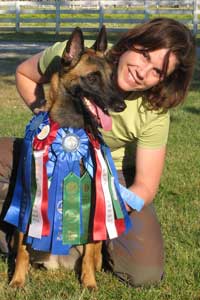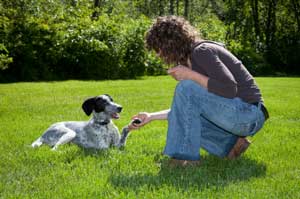Recently updated. Originally published 10/01/2011.
Behavior problems are the biggest threat to the human-animal bond, and the number-one reason dogs are relinquished. So what's the key to preventing problems before they start? Debbie Martin, KPA faculty member and ClickerExpo faculty member, says, "Get them while they're young!" One of the few veterinary technicians in the country to specialize in behavior modification, Debbie has always had an interest in animal behavior. She has dedicated her career to helping pet owners resolve their pets' behavior problems. Recognizing that prevention is easier than treatment, Debbie believes that many behavior problems can be averted with early socialization and foundation training.
Through her book, Puppy Start Right: Foundation Training for the Companion Dog, and now with her KPA course, Puppy Start Right for Instructors, Debbie continues to give pet owners, veterinary professionals, and trainers the information and support they need to improve the welfare of dogs—one puppy at a time!
Debbie, please tell us what led to your interest in the animal behavior profession?

I always had an interest in working with animals. When I was 14, I volunteered at a veterinary hospital during the summer. I planned on becoming a veterinarian, but when I entered college I decided to pursue a degree in family relations and human development. I was drawn to the physical and psychological aspects of human development.
While I was working on my master's degree and teaching preschool, a desire to have a career with animals made me switch gears. I enrolled in a community college to obtain a two-year Associate of Applied Science in Veterinary Technology degree. I loved the medical side of working as a veterinary technician, but was drawn to the behavioral and developmental aspects of animals. In 1997, I took over teaching puppy classes for a technician who was going on maternity leave and would no longer be teaching. In the classes I was able to apply successful "parenting" techniques used in child-rearing to my work with puppies. I was hooked! It was the perfect combination of careers for me.
Through my work with puppies, I learned quickly that not all behavior disorders can be prevented, and that some puppies as young as 8 weeks of age can show signs of serious future behavior disorders. I sought more continuing education focused on animal behavior and began to put together behavior services with the veterinarians I worked with in Ohio. I was lucky enough to attend the DOGS! Course at Purdue University. It was this course that confirmed my desire to become a behavior technician.
How did you develop your training skills?
I developed some basic skills for teaching using lure-reward training in the puppy socialization classes I taught. I was interested in learning more about training, but was turned off by the methodology used in most classes. The people and the dogs did not look like they were having fun.
I wanted to do something fun with my own dog, so in 1997 I enrolled my 7-year-old shepherd mix, Snickers, in a beginner clicker training class with Dog Talk Training in Columbus, Ohio. My interest in training was sparked in the class. The owner of Dog Talk Training wanted to start puppy socialization classes; we worked together to develop a curriculum and I became the lead instructor. I also began instructing the beginner clicker training courses.
My training background has been all-positive. It used to be that when I met other positive trainers I was one of the few who were not cross-over trainers. I am glad to be meeting more and more trainers who have taken a positive path from the start. This trend is a reflection of the shift in training methodology over the years.
You are a graduate of Karen Pryor Academy (KPA) as well as a faculty member. What did KPA give you that you didn't already have?
Although I had been clicker training for 11 years before enrolling in the KPA Dog Trainer Program, the course put it all together for me and improved my skills ten-fold. I had the concepts and understood them, but the course helped me apply them systematically. The course also made me look for the positive not just in the animals I was training, but also in all aspects of my life. I developed an attitude that focused on the positive and found the good in everything.

What led to your current position as a behavior technician at Veterinary Behavior Consultations?
As behavior had been a longstanding interest of mine, it was natural to work toward becoming a specialist in that area. I worked fulltime (1996-2007) and part-time (2007-2008) as a regular veterinary technician doing surgery, dentals, wellness care, emergency care, and more. At the same time, I worked on developing my behavior skills, knowledge, and experience.
I left Ohio and took a position at Purdue University Veterinary Teaching Hospital, hoping to apply for a veterinary behavior technician internship (unfortunately this never came to pass). Working at the university I met Julie Shaw, the behavior technician, Dr. Andrew Luescher, the head of the behavior department, and Dr. Kenneth Martin, the behavior resident.
After Dr. Martin completed his behavior residency in 2004, he returned to New Orleans, and in 2005 opened up his own mobile veterinary practice, Veterinary Behavior Consultations. I became the behavior technician for Dr. Martin, who is now my husband, in April 2005. By 2005 when Veterinary Behavior Consultations opened and I began working with Dr. Martin, my main focus as a technician was on behavior. In the spring of 2008, I stopped working in general veterinary practice so that my time did not have to be divided.
The primary motivation for opening Veterinary Behavior Consultations was to help pet owners with dogs, cats, or parrots with behavior disorders. Our goal is to enhance and maintain the human-animal bond and improve the welfare of both the pets and the owners. We want to decrease pet relinquishment and foster the human-animal bond whenever it is safe and possible to do so. Behavior problems are the number-one reason for pet relinquishment and, consequently, have become the number-one killer of dogs.
You are currently one of very few veterinary technicians to specialize in behavior modification. Tell us more about the field and about your own passion for it.
Behavior is a new specialty and it takes time for technicians to meet the eligibility requirements. In 2008, the National Association of Veterinary Technicians in America (NAVTA) recognized behavior as a veterinary technician specialty; the first examination was given in July of 2010. There are currently nine Veterinary Technician Specialists in Behavior—VTS (Behavior) for short. The application process and the requirements to take the examination are lengthy. The Academy of Veterinary Behavior Technicians (AVBT) administers the exam. I am currently the president-elect for AVBT!
There are so many things I love about behavior. Two of the things I am drawn to are educating and observing. I have always been an educator and enjoy teaching people, dogs, cats, and other species. Observing the learning process as it occurs in a variety of species is always invigorating to me. No two people or animals learn exactly the same way and that is what makes behavior and training so exciting. That is also what makes it difficult for pet owners, because people often want a set of rules to follow. The main rule I have is to observe the learners; they will tell you what is working and what is not working.
Tell us about a success story that you are particularly proud of.
This is the hardest question for me to answer and I think it is because I am proud of all of our clients for seeking help. It is impossible to pull out just one story. Each and every owner who contacts us or seeks our help is part of a success story regardless of the level of progress they make. When we are able to enhance the bond between pet parents and pets, that's always a success story for us.
You offer a systematic program to help pet owners give their puppies the right start. Tell us more about the program and why you feel it is important.
The goal of Puppy Start Right is to educate owners about normal puppy behavior and to give them positive tools for addressing these behaviors. Puppy parents are encouraged to catch their puppies doing things they like (chewing on dog toys, resting on beds, etc.) and reward those behaviors. Behaviors that are reinforced will increase in frequency. Starting the owners off on the right foot means that they will focus on the positive from the beginning. Starting the owners off on the right foot means that they will focus on the positive from the beginning.
Many behavior issues or conflicts between owners and pets are the result of miscommunication. We can avoid potentially damaging miscommunication by giving the puppy parent appropriate and positive tools to solve behavior issues. The number-one killer of dogs is not medical or infectious disease, it is behavior—because behavior issues are the most common reason dogs are relinquished. Preventing or minimizing behavior problems through education and understanding saves dogs' lives.
Socializing a puppy during the first three months of life is the single most important thing a puppy parent can do to ensure the dog's behavioral and mental wellness. Proper—and positive—early socialization allows all dogs to reach their full potential. Lack of positive exposure to novel people, environments, and stimuli during the first three months of life can cause dogs to be socially inhibited, fearful, and potentially aggressive.
Our Puppy Start Right book and preschool classes emphasize the fun while they teach owners how to provide positive exposure, recognize early signs of fear, and address fear properly. Early intervention is where we can truly make a difference, preventing problems before they materialize.
We're excited to introduce Puppy Start Right in the clickertraining.com store! Tell us why you and Dr. Martin wrote this book and what you hope readers will take away?
We wanted to provide dog owners of all ages with a behavior and training resource that is comprehensive yet easy to read. The book outlines our own methodology and our perspective on living with dogs. We hope the information in our book helps dog owners empathize with their dog, start on the right foot/paw, and create a parenting relationship based on mutual trust. Puppy Start Right was written to strengthen the human-dog bond and decreases the chance of relinquishment. The best way to achieve those goals is through education about normal behavior, prevention, problem-solving, and humane training.
What is the most important piece of advice you would give to a trainer who is considering offering puppy classes?
Early socialization puppy classes (puppies 7-12 weeks of age at the start of class) are the most important services you can offer for the behavior wellness of the puppy. How many owners call when they are at their "wits end?" Reaching the new puppy owner early sets everyone up to be successful.
At this early age, desirable habits are formed by the owner and the puppy, allowing for better communication and understanding on both ends. Prevention is easier than treatment! Working with puppies less than 12 weeks of age is one of the most rewarding parts of my career. Even after working a long 10-12 hour day in the veterinary hospital, teaching puppy classes was always rejuvenating and fun. In that role, I was responsible for facilitating the new human-animal bond between the puppy and owner, a bond based on trust and understanding.
Puppy classes can help prevent relinquishment and can keep dogs in their home.Puppy classes can help prevent relinquishment and can keep dogs in their home. By offering puppy classes, trainers also bond the client to themselves and their facilities. A client comes to a puppy class to have fun and not necessary to "fix" existing problems. This first fun puppy class creates a positive association with the trainer (classical conditioning).








Marty, a Puppy Start Right success story!
Marty is one of Debbie's many success stories. Marty showed a fear of being clipped while still a very young puppy. Quite a problem for a miniature poodle destined for a lifetime of regular grooming! Early intervention with clicker training and the Puppy Start Right program has changed grooming to a more pleasant experience for both Marty and me. Marty has overcome his early fear of the clippers and now freely sits or stands calmly for clipping. No leashes or restraint needed here! Thanks, Debbie!
Post new comment